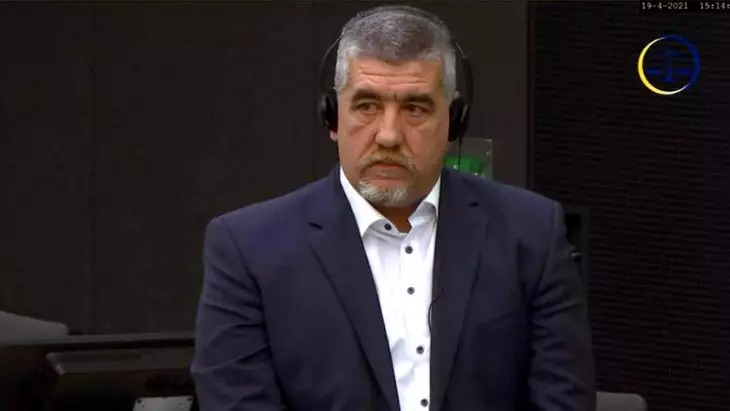The name of Pjetër Shala – also known as “Commander Wolf” – has been mentioned before the International Criminal Tribunal for the former Yugoslavia and by EULEX, the European Union’s rule of law mission in Kosovo, which had no not considered a priority to judge him. Today, the trial of the former Kosovo Liberation Army fighter begins before the Kosovo Specialized Chambers.
Before his trial began on February 21 in The Hague, the former commander of the Kosovo Liberation Army (UCK) was suspected of war crimes by two other international legal bodies, which had not charged him. . Today, Pjetër Shala is charged before the European Union-backed Special Court for Kosovo with alleged murder, torture and arbitrary detention in 1999, while he was in charge of a detention facility in at the Kukёs metallurgical plant in northern Albania.
Shala, 59, has been held in pre-trial detention by the Specialized Chambers of Kosovo (CSK) for almost two years, since his arrest in Belgium in 2021. He has pleaded not guilty to four counts of crimes of war brought against him, during his first appearance in court. He had joined the KLA in 1998, then led by Ramush Haradinaj, who later became Prime Minister of Kosovo from 2004 to 2005. Haradinaj was acquitted of charges of war crimes and crimes against humanity brought against him by the International Criminal Tribunal for the former Yugoslavia (ICTY).
Witness at Harradine’s Trial
Shala’s name appears in the indictment issued against Haradinaj. The prosecutor’s office says it suspects him of having participated in the murder, detention and torture of civilians in Albania. He was questioned twice by the ICTY as a suspect, in 2005 and again in 2007. Later the same year, Shala was cited by the prosecution in Haradinaj’s trial. Before his testimony, the presiding judge asked the prosecutor if there was any chance that an indictment could be issued against Shala. The prosecutor ambiguously replies that it would be “completely impossible as things stand”, but that if “he were to be questioned again, he would be as a suspect”, according to the transcript of Shala’s testimony, heard by the ICTY on October 30, 2007.
“The ICTY has focused on the most senior officials,” said Aidan Hehir, specialist in international relations at the University of Westminster and justice in the Balkans. According to him, Shala was not prosecuted because he was a relatively low-level commander and the ICTY did not have sufficient resources to prosecute all the accused.
In 2010, his name resurfaced – also without being targeted – in an indictment of five KLA fighters for war crimes, drawn up by a prosecutor from the European Union’s rule of law mission. in Kosovo, or EULEX. The group was found guilty of war crimes in 2013 by a national court in Kosovo, for acts that took place in the same detention center located in Kukёs.
It is unclear why Shala has not been charged. A 2012 audit report described EULEX as “not effective enough”. Despite some 3.6 billion euros in funding, the Brussels-backed mission had been unable to tackle endemic corruption and a lack of transparency in the judicial system. Following this mission, “there has been virtually no progress in establishing the rule of law in northern Kosovo”, noted the report. The mission is described as being paralyzed by unqualified personnel, bureaucratic red tape and the impossibility of coordinating its actions with others, in particular with the United States.
The Fear of Talking About The Kla
The history of this partially recognized state partly explains some difficulties in bringing charges against former members of the KLA. The KLA was founded in the 1990s in response to violence inflicted by the Serbs. For many in Kosovo, it is seen as a liberating force whose heroes should be celebrated. Many members of the government of the capital Pristina cut their teeth in the KLA.
Protecting witnesses who would like to testify against ex-KLA members has always been a challenge. Carla Del Ponte, the former chief prosecutor of the ICTY, described the KLA investigations as the “most frustrating” of all the tribunal’s endeavours. “Witnesses were so frightened and intimidated that they even feared to talk about the presence of the KLA in certain areas, let alone the crimes themselves,” she wrote in her memoir, “Madame Prosecutor,” published in 2009.
Prosecutions of former KLA fighters seemed unlikely to become widespread, until the political context changed and the now famous report by Swiss diplomat Dick Marty was published accusing, among other crimes, the armed organ trafficking group. Marty’s report, prepared for the Council of Europe, was published in 2010 and pointed to top-level responsibility, naming Hashim Thaçi, the former KLA political director. Shala’s name does not appear in this report, although he refers to the responsibility of “KLA commanders” on the Kukёs site.
To limit the effects of corruption and the informal protection granted to former members of the KLA, the Specialized Chambers and the Specialized Kosovo Prosecutor’s Office, supported by the international community, were set up in 2017 in La Hague, and staffed with international lawyers and judges, many of whom came from EULEX.
Despite these precautions, the court’s first convictions concerned a witness intimidation case involving two leaders of the UCK veterans’ association in 2022. The former president and vice-president of the association, Hysni Gucati and Nasim Haradinaj, were each sentenced to four and a half years in prison for obstruction of justice, for leaking classified court documents in 2020.
It was only at the very end of last year that the court handed down its first war crimes conviction, finding a KLA commander, Salih Mustafa, guilty of murder, torture and arbitrary detention. for running a prison camp during the conflict. The start date for Thaçi’s trial – already postponed twice – is now announced for April.
Eight victims are parties to the Shala case. According to the indictment, the victims were civilians, either Serbs who did not take part in the fighting or Kosovo Albanians suspected of treason by the KLA. Shala has consistently denied all allegations against him, from the ICTY to EULEX to the Kosovo tribunal. “I do not feel that I have committed any crime, except that I defended my country; I am completely innocent,” he said during his first court appearance in 2021.
For two days, the prosecution and the defense will present their opening statements. The trial is expected to last at least until the fall.
This article is originally published on justiceinfo.net









